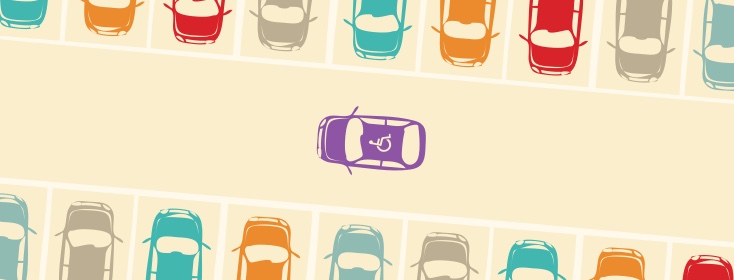Invisible Illnesses & Handicapped Parking
Ever since the day I was first issued my handicapped parking placard, I have been waiting for someone to give me a hard time about it. I’ve heard horror stories from other patients with invisible illnesses – complete strangers yelling at them, nasty notes left on the dashboard – and I figured it was only a matter of time until something like that happened to me. Recently, someone finally gave me a hard time about it – but not at all in the way I expected.
Deciding to use handicapped parking
I was in the car with my husband, both of my boys, and a friend. We had decided to take the kids swimming at the local rec center, but when we arrived it turned out to be extremely crowded because there was a gymnastics competition going on that day. Since I was dealing with intense fatigue and knee pain that weekend, my husband decided to park in a handicapped spot to make the afternoon a bit easier for me.
To make room for everyone in our car, I was sitting in the back seat, squashed between my sons' huge, rear-facing car seats. As I awkwardly clambered out from in between their seats, my friend joked “Maybe you ought to look a little more disabled if we’re going to park here!”
I think my friend was nervous
Now he wasn’t saying that I shouldn't park there. He has seen me struggle with pain and knows that I deserve to catch a break wherever I can. In fact, this friend has encouraged me to make use of handicapped parking and seating many times. He was only making a joke to diffuse his own discomfort with the idea that someone might look over and wonder whether we were using the placard legally. He was probably just as nervous as I have always been that some stranger might try to give us a hard time.
Is there an expectation for handicapped parking?
Because the thing is, there seems to be some sort of expectation that people should be able to tell whether you “deserve” to park in a handicapped spot just by looking at you. Most people probably believe that you should be old, or in a wheelchair, or walking with a cane, or wearing a cast – something to make it visibly obvious that you deserve the placard. When people think about handicapped parking, most people don’t picture a young mom hauling her two young kids (and all their gear) to the pool.
My RA pain and fatigue isn't visible
And so, because there is no visible sign of the amount of pain and fatigue I am experiencing, people judge. People assume. People decide based on how I look that I don’t “deserve” it.
My RA disability doesn't have to be visible
But nowhere in the state of Colorado’s requirements for being issued a handicapped placard does it say I have to look disabled. My doctor and I met all the state’s requirements, so I have every right to make use of handicapped parking whenever I determine it is necessary or even just useful.
I just wish it didn’t make me – and the people around me – feel so uncomfortable.

Join the conversation